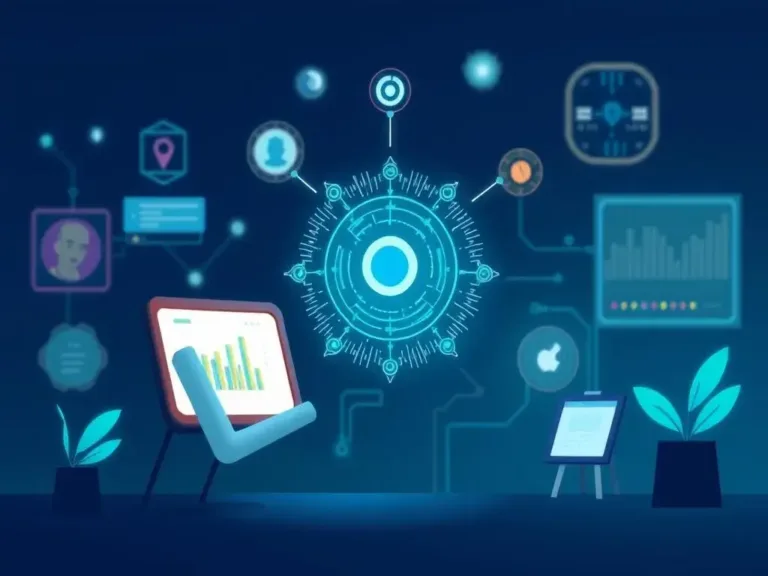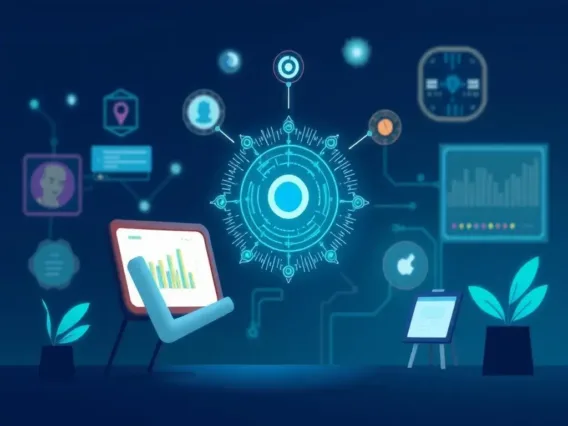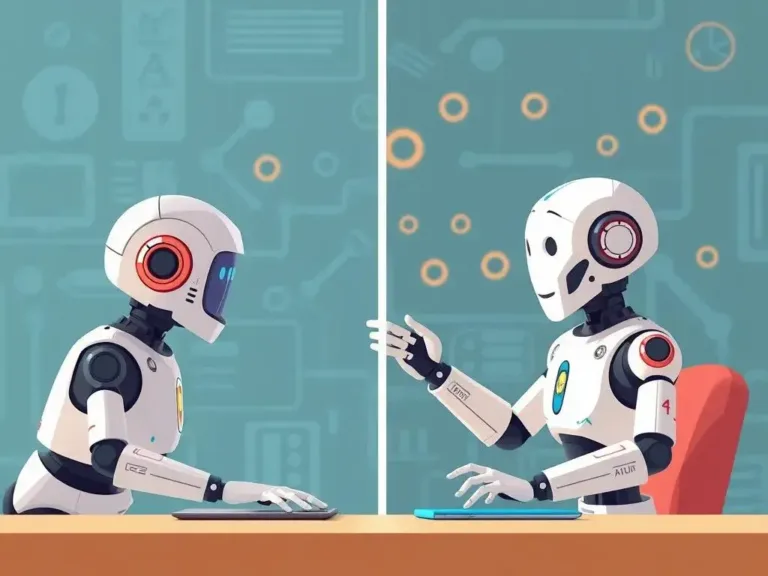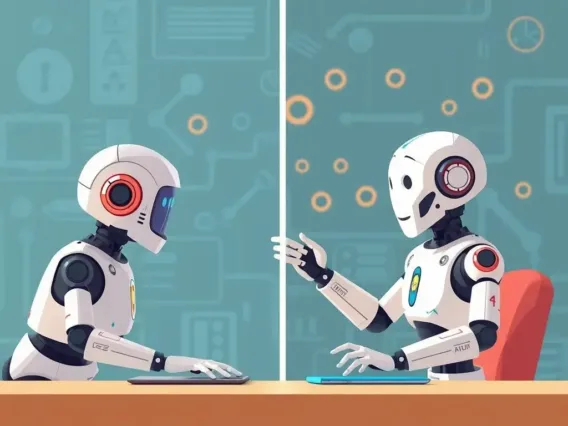In this essay, we will explore the concept of artificial intelligence, its current applications, and its future implications. AI is being applied in a wide range of industries, from healthcare to finance, transportation to entertainment. However, the future implications of AI extend far beyond these current applications. As technology continues to advance, AI has the potential to transform every aspect of our lives. Work order management is the recording, tracking, and handling of the completion of customer issues. Despite the many potential benefits of AI, there are also concerns about its impact on society. One of the main concerns is the potential for job displacement.
As AI systems become more advanced, there is a risk that they could replace human workers in certain industries. Additionally, there are concerns about privacy and security, as AI systems have the ability to collect and analyze vast amounts of personal data. Artificial Intelligence has become an integral part of our daily lives, impacting various industries and sectors. One area where AI has made significant advancements is in healthcare. AI-powered systems can analyze medical data, identify patterns, and assist in diagnosing diseases. In the field of finance, AI has revolutionized the way we handle transactions and manage investments.
AI algorithms can analyze vast amounts of financial data and identify trends and patterns that can be used for making investment decisions. Another area where AI has made significant strides is in transportation. Self-driving cars, powered by AI algorithms, are being developed by companies like Tesla, Google, and Uber. AI is also being utilized in the field of education. Intelligent tutoring systems can provide personalized learning experiences to students, adapting the curriculum based on their individual needs and learning styles. While AI has brought about numerous benefits and advancements, there are also concerns regarding its ethical implications. The use of AI in surveillance systems, for example, raises questions about privacy and security.
Additionally, the potential for AI to replace human jobs has sparked debates about the impact on employment and the need for reskilling and upskilling the workforce. Artificial Intelligence has the potential to transform various industries and sectors, improving efficiency, accuracy, and decision-making. From healthcare to finance, transportation to education, AI is revolutionizing the way we live and work. However, it is crucial to address the ethical implications and ensure that AI is developed and used responsibly to benefit society as a whole. Current applications of AI include healthcare, finance, transportation, and retail. AI is being used to improve diagnostics, treatment plans, and patient care in healthcare.
In finance, AI is used for fraud detection, risk assessment, and algorithmic trading. At transportation, AI is used for self-driving cars and intelligent traffic management systems. In retail, AI is used for personalized marketing, inventory management, and customer service. The future of AI holds even more potential, with applications in customer experience, transportation and logistics, education and personalized learning, environmental sustainability, entertainment and creative industries, and cybersecurity and fraud detection. With responsible development and deployment, AI can bring about significant positive changes and contribute to a better future for humanity.
Rise of Artificial Intelligence: Exploring Applications and Future
Artificial Intelligence (AI) has become a buzzword in recent years, captivating the imagination of scientists, entrepreneurs, and the general public alike. With its potential to revolutionize industries and reshape the way we live and work, AI is a topic of great interest and debate. In this essay, we will explore the concept of artificial intelligence, its current applications, and its future implications.
At its core, artificial intelligence refers to the development of computer systems that can perform tasks that would typically require human intelligence. These tasks include speech recognition, problem-solving, learning, and decision-making. AI systems are designed to analyze vast amounts of data, identify patterns, and make predictions or recommendations based on that analysis.
Currently, AI is being applied in a wide range of industries, from healthcare to finance, transportation to entertainment. In healthcare, AI is being used to assist in the diagnosis and treatment of diseases, helping doctors to make more accurate and timely decisions. At finance, AI algorithms are being used to analyze market trends and make investment decisions. In transportation, AI is being used to develop self-driving cars, which have the potential to reduce accidents and improve traffic flow.
However, the future implications of AI extend far beyond these current applications. As technology continues to advance, AI has the potential to transform every aspect of our lives. For example, in the field of education, AI could be used to personalize learning experiences, tailoring curriculum and teaching methods to individual students’ needs. In the field of agriculture, AI could be used to optimize crop production, helping farmers to increase yields and reduce waste. In the field of manufacturing, AI could be used to automate processes, improving efficiency and reducing costs.
Despite the many potential benefits of AI, there are also concerns about its impact on society. One of the main concerns is the potential for job displacement. As AI systems become more advanced, there is a risk that they could replace human workers in certain industries. This could lead to widespread unemployment and economic inequality. Additionally, there are concerns about privacy and security, as AI systems have the ability to collect and analyze vast amounts of personal data.
In conclusion, artificial intelligence is a rapidly advancing field with the potential to revolutionize industries and reshape the way we live and work. While there are many exciting possibilities for AI, there are also important ethical and societal considerations that need to be addressed. As AI continues to evolve, it is crucial that we have a thoughtful and informed discussion about its implications and how to ensure that it benefits all of humanity.
Artificial Intelligence has become an integral part of our daily lives, impacting various industries and sectors. One area where AI has made significant advancements is in healthcare. AI-powered systems can analyze medical data, identify patterns, and assist in diagnosing diseases. For example, AI algorithms can analyze medical images such as X-rays and MRIs to detect abnormalities and assist radiologists in making accurate diagnoses. AI can also help in predicting patient outcomes and recommending personalized treatment plans based on individual characteristics and medical history.
In the field of finance, AI has revolutionized the way we handle transactions and manage investments. AI-powered chatbots and virtual assistants are being used by banks and financial institutions to provide customer support and answer queries. AI algorithms can analyze vast amounts of financial data and identify trends and patterns that can be used for making investment decisions. This has led to the development of robo-advisors, which are AI-powered platforms that provide automated investment advice based on an individual’s financial goals and risk tolerance.
Another area where AI has made significant strides is in transportation. Self-driving cars, powered by AI algorithms, are being developed by companies like Tesla, Google, and Uber. These cars use sensors and cameras to analyze the environment, make decisions, and navigate safely on the roads. AI can also optimize traffic flow by analyzing real-time data and adjusting traffic signals accordingly, reducing congestion and improving overall efficiency.
AI is also being utilized in the field of education. Intelligent tutoring systems can provide personalized learning experiences to students, adapting the curriculum based on their individual needs and learning styles. AI-powered virtual reality tools can create immersive learning environments, allowing students to explore complex concepts in a more interactive and engaging manner. AI can also assist teachers in grading assignments and providing feedback, saving time and improving efficiency.
While AI has brought about numerous benefits and advancements, there are also concerns regarding its ethical implications. The use of AI in surveillance systems, for example, raises questions about privacy and security. Additionally, the potential for AI to replace human jobs has sparked debates about the impact on employment and the need for reskilling and upskilling the workforce.
In conclusion, Artificial Intelligence has the potential to transform various industries and sectors, improving efficiency, accuracy, and decision-making. From healthcare to finance, transportation to education, AI is revolutionizing the way we live and work. However, it is crucial to address the ethical implications and ensure that AI is developed and used responsibly to benefit society as a whole.
Current Applications of Artificial Intelligence
Artificial Intelligence has already made significant advancements in various fields, transforming industries and improving efficiency. Here are some of the current applications of AI:
1. Healthcare
AI has the potential to revolutionize healthcare by improving diagnostics, treatment plans, and patient care. Machine learning algorithms can analyze medical data, such as patient records and imaging scans, to detect patterns and make accurate predictions. AI-powered robots and virtual assistants can also enhance patient monitoring and provide personalized care. For example, AI algorithms can analyze a patient’s medical history, symptoms, and genetic information to provide personalized treatment plans. AI-powered robots can assist surgeons during complex procedures, improving precision and reducing the risk of human error. Additionally, virtual assistants can provide patients with real-time health advice and reminders for medication and appointments.
2. Finance
In the finance industry, AI is used for fraud detection, risk assessment, and algorithmic trading. Machine learning algorithms can analyze large datasets to identify suspicious transactions and patterns that indicate potential fraud. AI-powered chatbots are also being used to provide customer support and streamline banking processes. For instance, AI algorithms can analyze customer transactions and behavior to detect anomalies and flag potential fraudulent activities. AI-powered chatbots can handle routine customer inquiries, such as balance inquiries and transaction history, freeing up human agents to focus on more complex issues. Moreover, AI algorithms can analyze market data and historical trends to make informed investment decisions and execute trades in real-time.
3. Transportation
AI is transforming the transportation industry with the development of self-driving cars and intelligent traffic management systems. Autonomous vehicles equipped with AI technology can navigate roads, detect obstacles, and make real-time decisions to ensure safe and efficient transportation. AI algorithms can also optimize traffic flow and reduce congestion. For example, self-driving cars can use AI algorithms to interpret road signs, recognize pedestrians and other vehicles, and navigate complex traffic scenarios. Intelligent traffic management systems can use AI algorithms to analyze traffic patterns, predict congestion, and adjust traffic signals in real-time to optimize traffic flow. This can lead to reduced travel times, lower fuel consumption, and improved overall transportation efficiency.
4. Retail
In the retail sector, AI is used for personalized marketing, inventory management, and customer service. Recommendation systems powered by AI can analyze customer data and preferences to provide personalized product recommendations. AI chatbots can assist customers with inquiries and provide support, enhancing the overall shopping experience. For instance, AI algorithms can analyze customer purchase history, browsing behavior, and demographic information to recommend products that are most likely to be of interest to each individual customer. AI-powered chatbots can engage with customers in real-time, answering their questions, providing product information, and even processing orders. This can improve customer satisfaction, increase sales, and streamline the overall retail operations.
These are just a few examples of how AI is currently being applied in various industries. As technology continues to advance, we can expect to see even more innovative applications of AI that will further transform the way we live and work.
5. Improved Customer Experience
With the advancement of AI, customer experience is expected to be greatly enhanced. AI-powered chatbots and virtual assistants can provide personalized and efficient customer support, available 24/7. These intelligent systems can understand and respond to customer queries, provide product recommendations, and even anticipate customer needs, leading to higher customer satisfaction and loyalty.
6. Transportation and Logistics
AI has the potential to revolutionize transportation and logistics industries. Self-driving cars and trucks powered by AI can improve road safety and reduce traffic congestion. AI algorithms can optimize route planning, leading to more efficient delivery systems. Additionally, drones equipped with AI can be used for fast and accurate package delivery, especially in remote areas.
7. Education and Personalized Learning
AI can transform education by enabling personalized learning experiences. Intelligent tutoring systems can adapt to individual student needs, providing tailored instruction and feedback. AI-powered educational platforms can analyze student performance data to identify areas of improvement and suggest personalized learning resources. This can lead to more effective and engaging learning experiences for students of all ages.
8. Environmental Sustainability
AI can play a significant role in addressing environmental challenges. Machine learning algorithms can analyze environmental data to identify patterns and predict climate change impacts. AI-powered systems can optimize energy consumption, improve waste management, and enhance resource allocation. By leveraging AI, we can make more informed decisions and take proactive measures to mitigate the effects of climate change.
9. Entertainment and Creative Industries
AI is already making its mark in the entertainment and creative industries. AI algorithms can generate music, art, and even write stories. Virtual reality experiences powered by AI can provide immersive and interactive entertainment. AI can also enhance the production process in filmmaking and video game development, enabling more realistic graphics and animations.
10. Cybersecurity and Fraud Detection
As technology advances, so do cybersecurity threats. AI can be a powerful tool in detecting and preventing cyberattacks. Machine learning algorithms can analyze vast amounts of data to identify patterns and anomalies, helping to detect potential threats in real-time. AI can also improve fraud detection systems by detecting suspicious activities and patterns, reducing financial losses for individuals and organizations.
In conclusion, the future of artificial intelligence is full of potential and possibilities. From automation and job displacement to advancements in medicine and improved decision-making, AI is set to transform various industries and aspects of our lives. However, it is crucial to address ethical considerations, ensure proper regulations, and strike a balance between human judgment and AI recommendations. With responsible development and deployment, AI can bring about significant positive changes and contribute to a better future for humanity.













8 Comments